- Home
- S. A. Barton
Garbage Music Page 4
Garbage Music Read online
Page 4
#
Jacinta had meant to go back the next day, but she found herself making excuses. There were fish to be caught in the river, wooden shingles to be made for the roof, weeding to be done among the crops, animals to be tended in the herds that wandered freely through town. The late spring of December gave way to summer, and it was not until a hot summer day in February that Jacinta found herself at the foot of the old eucalyptus tree again, leaning against the trunk, listening for the music. It was rarely silent there, but sometimes it was and this was one of those times. Jacinta wondered why. Did Neyerneyemeet simply not feel like playing some days? Was there a reason that she picked one day to play and one day not? Could Neyerneyemeet, who was older than the Last War, fall ill and be unable to play?
Jacinta had no answers.
This time, she was ready for the old mine. After her last visit, she had begun to carry the smaller of her family's two torches. It was an LED light, the bulb itself being one of the relatively few items The One People could not make by hand. It had been made in a factory, which was nothing like the factories of old. The factories of old, the historytellers said, were places of both wonder and horror. Vast banks of machines in town-sized longhouses, endlessly churning out only a few identical devices in endless mountains, thousands and thousands of factories churning, places of repeating, soul-killing drudgery, places that wore the souls off the people who did the dull work for long hours on end, spinning the wealth of the earth into cheap trinkets to be disrespected, used only a few times, and then thrown away to be buried in the ground as garbage.
Today, a factory was a small place run by a family or two of crafters who used machines to make what was too delicate or precise for a human hand to make, a place no bigger than a house that made what was needed and made it well, to last.
Jacinta's LED bulb had been made for her grandfather before her father had been born, and it still burned bright. It was set in a skeletal frame of fine manganese steel, and in the frame were set curving panels of polished and stained burlwood that reinforced the frame, wood worn yet smoother by fifty years of human hands, and finely engraved with images of sharks and kangaroo and dingoes and Burrunan dolphins. She had no idea how the battery was made or what it was made of, but she knew it had never needed replacing and that the torch plugged int the house battery to recharge from the solar skin of the rooftop that lay over the shingles.
With the torch firmly in hand, Jacinta descended into the pit and found the mineshaft that held Neyerneyemeet's chamber. Bringing the torch to life by twisting the bezel a quarter turn, she entered, shining it about to see the walls.
She stopped in place with a gasp.
The walls and ceiling were covered with carvings in the dark timbers. One wall was only names. The miners who had worked here for the century the mine had been active, Jacinta supposed. But the ceiling and the other wall were covered with images of animals and people and things, some ancient, some new. She saw solar catamarans, and she also saw warplanes from before the World War, sleek and sharp and sinister. There were landbuggies, the fat-tired automobiles that were made and used sparingly today, and also the old automobiles that ate petroleum oil and spat smoke into the air and swarmed like locusts. There were whole scenes of beaches and concerts and sporting games, with dozens of people carved no bigger than the end of a pinkie finger. She began to walk, slowly, watching the carvings pass her as she moved, sweeping the light to follow her gaze, a spotlight penetrating the past. Everywhere the light fell but the floor, there were engravings upon engravings upon engravings. She felt she should move no faster than she could understand them all, see what each of them was and divine their meanings. But she knew to do so would be to spend hours on every meter walked, and so she kept moving, if no faster than the day she had walked the same path blind.
The carvings stretched all the way from the entrance to the place where it joined the left-right passage in a T, where the timber supports grew farther apart. Jacinta stopped there for a moment and turned around, sweeping the light of her torch over the walls again and again, from where she stood to the bright spot of the exit, the intricacy of the images blurring before her as if seen from a low, fast aircraft. She had never ridden in one, they were seldom built and seldom used, but her imagination sufficed. Finally, she cupped the bright end of the torch in her hand, stifling the light, and rested in the dark feeling a bit dizzy with all she had seen.
And then it was time to go on. The cavern was quiet, with only the sigh of the breeze past the mineshaft's entrance, empty without music. Jacinta turned back to the passageways and retraced her steps to Neyerneyemeet's chamber. In the light of the torch she could see no light spilling past the blanket as she approached.
“Hello?” she said, barely above a whisper. There was no response. She quenched the torch and moved the blanket aside.
The chamber seemed wider than before, the ceiling higher, in the light of a single oil lamp resting on a small shelf incised into the wall beside the blanket. The shadows were thick in the back of the chamber where Neyerneyemeet had played for her before. Jacinta stood, still holding the blanket, peering into the shadows.
She could hear Neyerneyemeet breathe, though she could not see her among the shadows. Jacinta stepped inside and let the blanket fall behind her. She sat crosslegged upon the chilly floor again, and let her breathing fall into time with the ancient woman's. As she sat, her eyes adjusted to the dim and flickering light, and Neyerneyemeet materialized from within the shifting shadows, black on black on black, and the crescents of white eyes from within their deep sockets. Sitting crosslegged on the floor just as Jacinta was.
From inside the dark blanket that rested over her dark shoulders, Neyerneyemeet drew a sliver of ivory white, slightly curved, as long as her forearm, and slender. She raised it to her broad lips and her breathing changed and she blew into it softly.
The single notes quavered slightly, pure, drawn out, soft on the ends and thick in the middle, flowing into each other like waves on the running river, and yet each, somehow, alone in the dark. Gooseflesh covered Jacinta with a sudden quiver and a soft, soft gasp.
Jacinta forgot the shingles and the town, her father and mother, the animals and the people. In the flickering light Jacinta forgot the light itself, forgot Neyerneyemeet, forgot Jacinta.
There were only the notes, suspended in nothing, heard by nobody; there was the music and nothing more.
The music was sadness and hope. The music was pain and joy. The music was loss and growing. The music was the vanishing of an old world, and the vanishing of a newer world, and the emergence of a newer world still, from the ashes that had come before. The music was the fall of a people, and a mingling, and the rise of a new age and a new people. The music was togetherness and belonging.
The music was a remembering of the old ways and the older ways, pregnant with the knowledge of good and evil, heavy with warning, swelling toward dawn out of the night.
The music was one pair of eyes on the outside, always watching, always watched, never belonging. The music was alone in the middle of a busy town.
The music wept over a smile that outsiders never saw, in the dark.
And the notes doubled, and walked together, grew rich and broad, swelling toward...
...they ended. Neyerneyemeet stood, holding the sliver of ivory flute in her rich black hands, and knelt before Jacinta. One hand placed the flute in her lap, the other touched the trails of tears on Jacinta's cheeks gently and then touched her own tears, bright on the rich black face.
“My mother,” Neyerneyemeet said, her voice quiet and deep and gentle. Jacinta looked down at the flute in her lap, touched it with her fingers and lifted it up, feeling over the centuries-smoothed barrel, touching the holes one by one, exploring. And then she understood. She lifted the flute to her lips and blew a simple note, hardly knowing how to do more. It came out long and sweet.
In the half-light, Jacinta
played the flute carved from the bone of Neyerneyemeet's mother's arm, the old woman's black fingers reaching out to move Jacinta's brown ones, guiding, teaching. And though Jacinta returned many times to visit her mother and father and her people in the decades that followed, and to teach them the things Neyerneyemeet taught her, the old Jacinta never came home.
See more from S.A. Barton on his blog at https://sabarton.com
On Twitter at https://twitter.com/tao23
And on Facebook at
https://www.facebook.com/pages/S-A-Barton/312607662122218

 Maiden Flight
Maiden Flight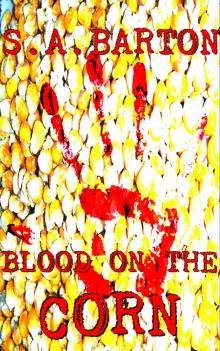 Blood on the Corn
Blood on the Corn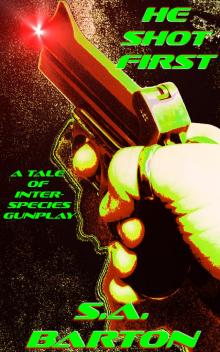 He Shot First
He Shot First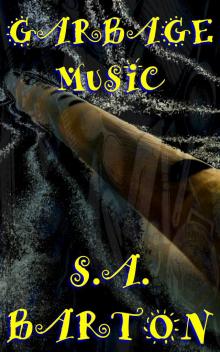 Garbage Music
Garbage Music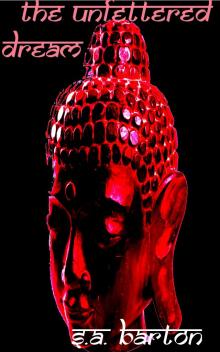 The Unfettered Dream
The Unfettered Dream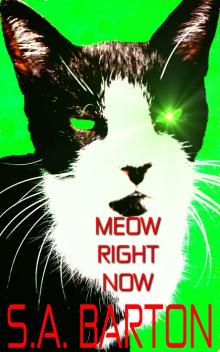 Meow Right Now
Meow Right Now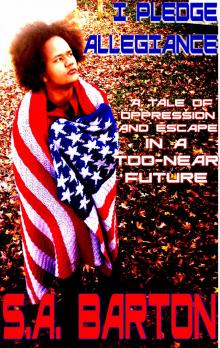 I Pledge Allegiance
I Pledge Allegiance Visions Of Odd
Visions Of Odd Spoken Wood
Spoken Wood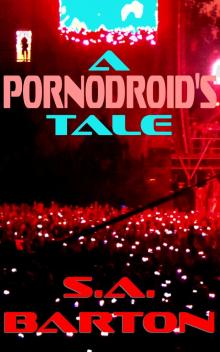 A Pornodroid's Tale
A Pornodroid's Tale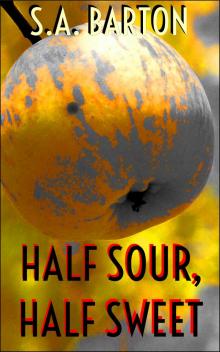 Half Sour, Half Sweet
Half Sour, Half Sweet